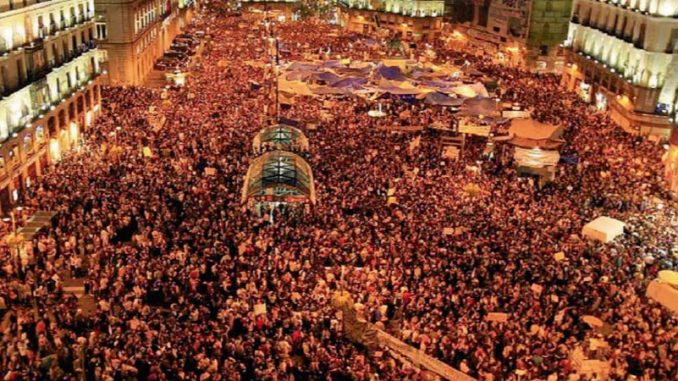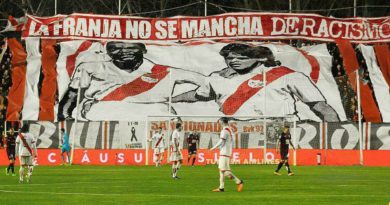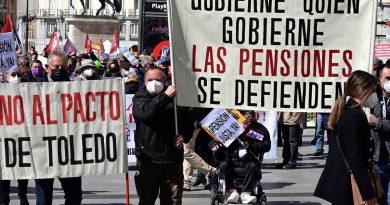A 10 15M years, various conclusions and an epitaph
By Rubén Tzanoff
A feat that was not enough to achieve fundamental changes. You have to recreate it, assimilating the changes you need to succeed. Can be done, moving away from reformism and building strong revolutionary socialist parties.
The capitalist crisis of 2008 had a hard impact on the Spanish State, deepening social inequality. Governments dedicated themselves to saving the banks and the powerful, at the same time as taking away historical conquests from the labor movement. Discontent did not take long to express itself through strikes and mobilizations against the policy of José Luis Rodríguez Zapatero. At the political level, broad social sectors came to the conclusion that the bipartisan "PPSOE" , democratic limitations and the system were the main causes of popular suffering. It is in this context that the 15M Movement emerges as a genuine expression of the Indignados, Of the youngs, Workers, pensioners and all those harmed by the capitalist crisis. From the call to the manifestation of the 15 May 2011 in Madrid, Puerta del Sol began to be the focus that illuminated the campsites, the assemblies and actions of different social groups that spread spontaneously through the cities and towns of the Spanish State. The slogans raised expressed the dominant mood, willing to bury the old politics: "We are not puppets in the hands of politicians and bankers" "Real democracy NOW!!" Later, in 2014 that hope took on a political form, the creation of Podemos, in which Pablo Iglesias and Iñigo Errejón stood out as founders. To a large degree, the world avant-garde, Worker and youth was inspired by the Indignados and the formation of Podemos to guide their action and take a course. A 10 years since the beginning of such a process, it is necessary to rethink what happened and draw conclusions for the future.
For sure, it was a great feat, but it was not enough to achieve profound changes. Because, you have to recreate it, but assimilating what you need to succeed and it was not realized. The next 15M has to be deeper and more extended, with a leading role of the workers, the students, the feminist movement and organized pensioners, with massive mobilizations and general strikes. It is not only because of a balance of the limitations of the past but also because of the path that the rebellions that run through the world begin to point out.. This time he has to be endowed with a transitional program, that in its democratic aspects of responses to the exhaustion of the parliamentary monarchical regime of ˋ78 and in the economic sphere it provides a way out of the capitalist crisis. With democratic bodies of debate and decision and combative and consistent leaders.
Great political processes leave their mark. They are recorded in the retina of millions of people in the world as a reference for action. They are mobilization processes with their own characteristics, phenomena clearly individualizable in themselves. And it is precisely this characteristic that differentiates the 15M from other dates that are blurred from the calendar. At the same time, social explosions are always related to political formations and leaders who, are born, die, advance or retreat according to their intervention in them. This reality makes it practically impossible to refer to 15M without analyzing the emergence, eye, growth and decline of Podemos and the future of center-left reformism worldwide.
The 10 15M years are given with a paradox. While they pose the need to recreate it, different and updated, they are witnesses to the political burial of a leader born from their womb. In the epitaph on the grave it could say: "Here lie the political remains of Pablo Iglesias and his reformist project". Whoever was the creator and top leader of Podemos has left politics after the elections of the 4 May Madrid. He has done it by saying: "When one is not useful, he has to know how to withdraw ", that is to say, based on a decision motivated by an electoral result, in the field of bourgeois democracy, which in the end was the one chosen by Iglesias to replace the scene of the class struggle. Facing the big changes that are needed, It is a retreat "without pain or glory". Iglesias was an emergent of the 15M process that interpreted the youth's tiredness with the old politics and "the caste" expressing it in a slogan for the positive: "If possible". Nevertheless, repeated the same scheme of other prominent reformists and their organizations, that ascend hoisting positions of profound changes, grow up adapting to the bourgeois democratic regime, they end up giving up the powerful and defrauding the confidence of the mass movement.
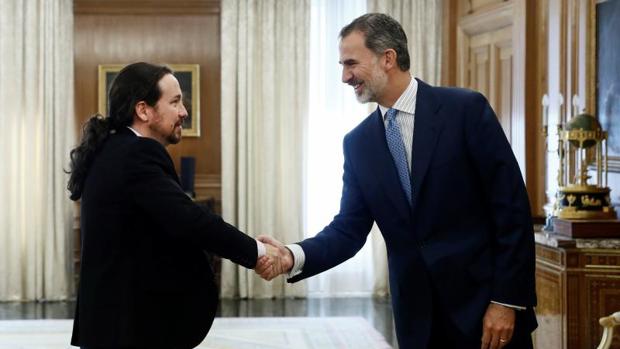
To reach the so-called "Town Halls of Change" and then join the bourgeois government of Pedro Sánchez (PSOE), Podemos was eliminating the most rebellious edges of his programmatic proposals until he surpassed the class borders, somersaulting backwards. It is not about the private actions of a national leader, but the general trend of the leaders of the center-left and "progressives" around the world. It's similar to Lula with the PT, to Correa with the PAÍS-Citizen Revolution Alliance, or to Tsipras with SYRIZA, to what the leaders of the Left Bloc in Portugal or Die Linke in Germany do. Even the PSOL of Brazil and the CUP of Catalonia are at a crossroads, they travel a winding road, on the edge of the precipice of barely critical reformism of the capitalist system. The lies, the demoralization and demobilization brought about by the reformists does not remain the subject of a thesis for academics dedicated to political science. Has concrete consequences: paves the way to the right. It is these counterrevolutionary expressions that are strengthened by each lie, before every disappointment and inconsistency of the center-left.
The decade that passed since 15M has to serve to reflect, How many times have we heard reformists like Iglesias say: "We are leftist and anti-capitalist" , "You have to change the parties from within" "You have to support the good of a government and criticize the bad"? To then see them adapt to the rules of the regime and the system of exploitation, agitating the utopia of "humanizing capitalism". And when they fail to convince the most combative sectors, they miserably argue "we are the lesser evil, support us only so that the right does not win ”when in reality they are the ones who pave the way. How many times are they silent in the face of the struggle of the peoples who rise up against center-left oppressors?! How many times do they try to lead the mass movement to take a position for Russian or Chinese imperialism against European or North American imperialism!, under the camping theory! These traps have their reactionary counterpart in the party organization. Iglesias and Podemos fill their mouths with "participatory democracy" and "horizontal" organization , but they are a bureaucratic mincer of political opponents and crushing of nuances, within which truly important decisions are made top-down. Reformers like Iglesias do not help to eliminate "the caste" , they wash their face as a “left leg” or are integrated into it.
Regrettably, in many cases the process of the rise of the reformists goes into its decline phase without the revolutionary socialist organizations having a policy towards them. Without deploying tactics to dialogue with the most combative sectors that follow these formations, even if they are confused, to gain influence over them and when the inevitable moment of political betrayal of their leaders arrives, channel it towards the strengthening of a socialist and revolutionary alternative. The rejection of tactics on these phenomena is a sectarian attitude that only favors the reformists, although it is tinged with a radical left speech.
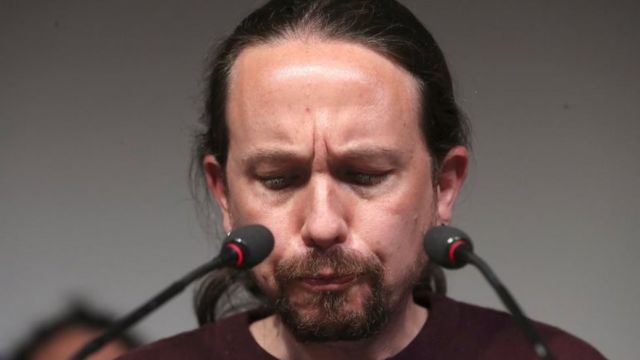
The reformists are not and will not be an alternative of profound changes to turn everything around. It's not about guessing the future, but to draw conclusions about the past and prepare for what is to come. Two serious crises of the capitalist economy in twelve years have not only opened important inter-imperialist friction, a fierce dispute over the markets and the "distribution of the cake"; have caused an oversizing of financial speculation on production. They have provoked looting, destruction of nature and increased external debts. And when this happens, A stage opens in which the bourgeoisie and its reformist partners do not even distribute the crumbs that fall from the table of the rich, in which the workers and the people are forced to fight with all their might to satisfy their most basic health needs, living place, education, employment and food. And this land of rebellions, mobilizations and struggles is precisely, the one reformists want to avoid or lead to a dead end. We are not at a stage in which the reformist leaders will "advance beyond their intentions" due to pressure from the class struggle or "particular historical circumstances.". It is the moment to put all the forces in the creation of the new. In the construction of anti-capitalist political alternatives, of socialist and revolutionary parties, to consequently boost mobilization, self-organization and class independence, the government of the workers and the people, next to socialism with democracy. Raising the flag of internationalism high, of solidarity between the peoples in struggle that, definitely, It is the strategic path through which the International Socialist League travels.

